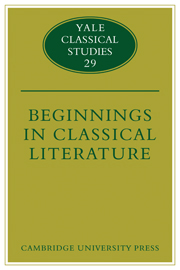Book contents
- Frontmatter
- Contents
- Introduction: beginning at Colonus
- How Greek poems begin
- The Muse corrects: the opening of the Odyssey
- Sappho 16, Gorgias' Helen, and the preface to Herodotus' Histories
- Tragic beginnings: narration, voice, and authority in the prologues of Greek drama
- Plato's first words
- Plautine negotiations: the Poenulus prologue unpacked
- Proems in the middle
- Openings in Horace's Satires and Odes: poet, patron, and audience
- An aristocracy of virtue: Seneca on the beginnings of wisdom
- Beginnings in Plutarch's Lives
- “Initium mihi operis Servius Galba iterum T. Vinius consules …”
Introduction: beginning at Colonus
Published online by Cambridge University Press: 10 January 2011
- Frontmatter
- Contents
- Introduction: beginning at Colonus
- How Greek poems begin
- The Muse corrects: the opening of the Odyssey
- Sappho 16, Gorgias' Helen, and the preface to Herodotus' Histories
- Tragic beginnings: narration, voice, and authority in the prologues of Greek drama
- Plato's first words
- Plautine negotiations: the Poenulus prologue unpacked
- Proems in the middle
- Openings in Horace's Satires and Odes: poet, patron, and audience
- An aristocracy of virtue: Seneca on the beginnings of wisdom
- Beginnings in Plutarch's Lives
- “Initium mihi operis Servius Galba iterum T. Vinius consules …”
Summary
“Well, now I'll turn to his prologues,” Euripides exclaims, “and the first part of the tragedy will be the very first thing of this clever man's that I put to the rack.” The earliest surviving example of literary criticism in antiquity is the riotous parody in Aristophanes' Frogs, where Euripides subjects the beginning of Aeschylus' Choephori to hair-splitting sophistic torture, and Aeschylus responds with verbal slap-stick, pummeling his opponent's prologues with a barrage of “little oil flasks.” Clearly enough, an author's opening words – μῆνιν ἄειδε, θεά, arma virumque cano – are charged with special meaning; and consequently, as Aristophanes reminds us, these opening words are an obvious target of criticism. The following collection of essays seeks to place in perspective literary openings and our readings of them by bringing together a broad sample of authors and critics. Before reviewing this range of approaches, I start with an example that renders problematic the very act of making a beginning.
The stage is empty. Slowly, two figures approach from the left. They hesitate, unsure which way to turn. Finally, they reach the center of the stage and pause. One is a frail old man and the other a younger woman, both in rags. The man turns to speak:
Child of a blind old man, Antigone, what
place have we come to, or what city of men?
Who will take in the wandering Oedipus
today, with meager gifts?
I ask for little, get even less,
and that's enough for me.
- Type
- Chapter
- Information
- Beginnings in Classical Literature , pp. 1 - 12Publisher: Cambridge University PressPrint publication year: 1992
- 2
- Cited by



